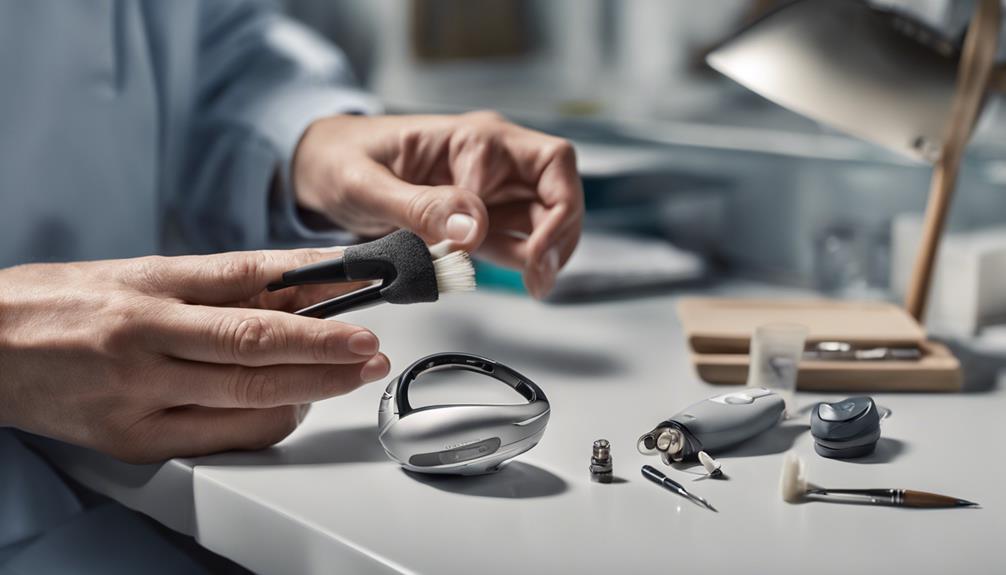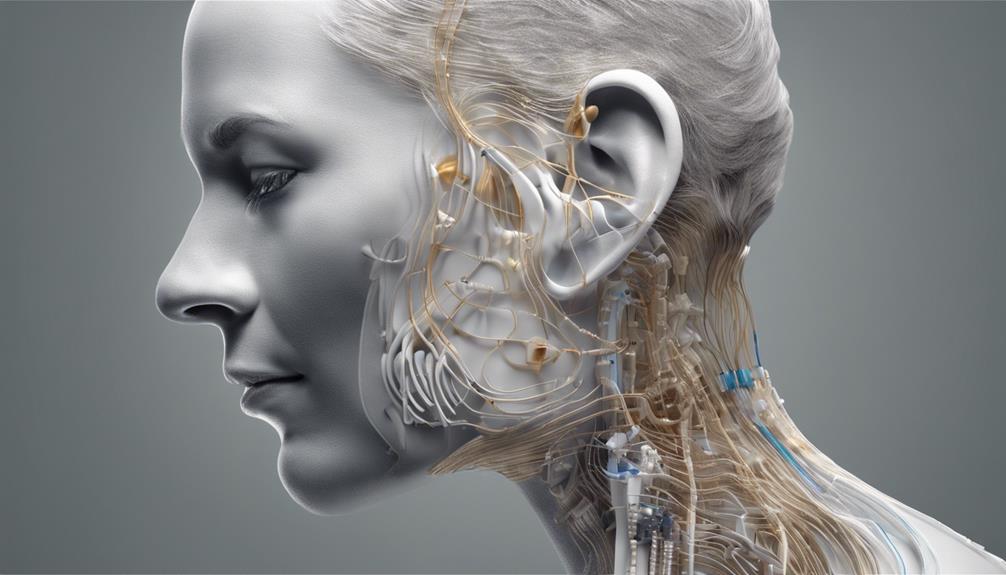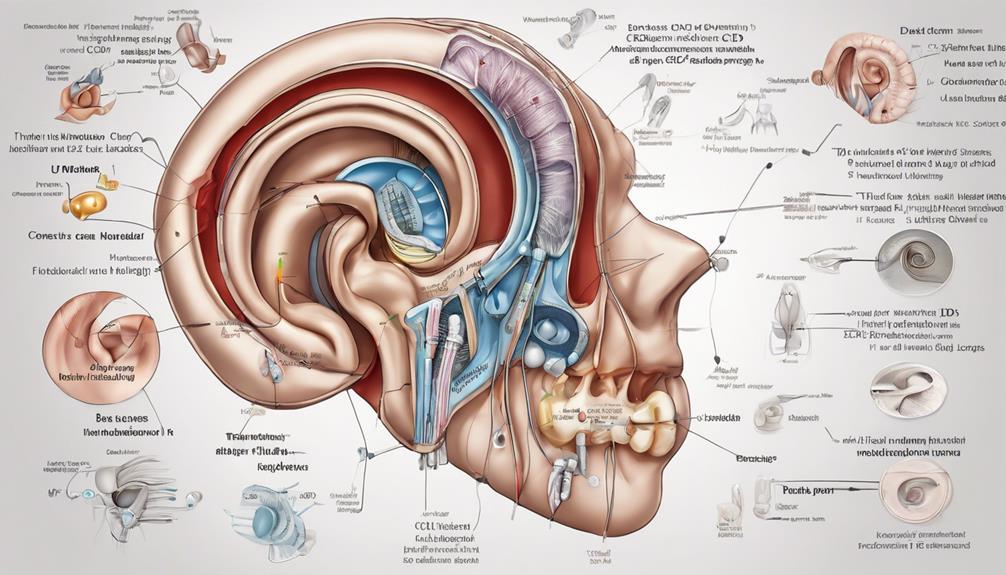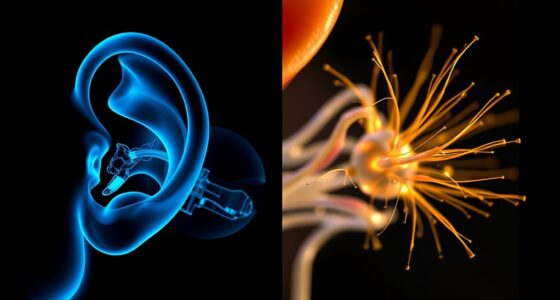When examining the common misconception about hearing aids, it is important to understand that these devices do not cause hearing loss.
However, uncovering the truth behind this belief requires us to delve into the intricate workings of these essential tools.
By unraveling the science behind how hearing aids function and their impact on our auditory health, we can better grasp the reasons why they are beneficial for individuals with hearing impairments.
Let's unearth the facts and dispel any doubts about the relationship between hearing aids and hearing loss.
Key Takeaways
- Hearing aids are designed to improve hearing, not cause harm or further hearing loss.
- Proper maintenance and use are essential to prevent discomfort and damage.
- Modern devices adhere to strict safety standards for user protection.
- Informed decisions and regular check-ups are crucial for optimal hearing aid performance.
Understanding Hearing Aid Technology
Understanding Hearing Aid Technology involves grasping the intricate mechanisms and functionalities that enable these devices to enhance sound perception for individuals with hearing impairment.
When considering Hearing aids, it's essential to first undergo a comprehensive Hearing Test to determine the type and degree of hearing loss one may have, particularly sensorineural hearing loss, which is commonly managed with hearing aids.
These devices utilize advanced technologies such as digital signal processing to amplify and adjust sounds based on the user's specific requirements. By tailoring sound amplification to individual needs, modern Hearing aids can provide clear and natural sound quality, improving speech understanding across various listening environments.
Directional microphones within Hearing aids play a crucial role in enhancing communication by focusing on speech from specific directions while minimizing background noise. Additionally, features like Telecoil technology offer wireless connectivity to compatible devices, ensuring seamless integration in public settings or during phone conversations.
Incorporating functionalities like feedback suppression, noise reduction, and automatic programming further enhance user comfort and overall effectiveness, making Hearing aids indispensable tools for individuals with hearing difficulties.
Debunking Hearing Aid Myths

After exploring the technologies behind hearing aids, it's important to dispel common misconceptions about these devices and their impact on hearing health. Here are some key points to debunk hearing aid myths:
- Hearing aids don't cause hearing loss: Contrary to a prevalent misconception, hearing aids are specifically designed to improve hearing for individuals with various types of hearing impairment.
- Proper use is crucial: While misuse like setting the volume too high can cause temporary discomfort or damage, when used correctly, hearing aids pose no risk of hearing loss.
- Modern devices undergo rigorous testing: Today's hearing aids are advanced technologies that meet stringent safety standards to ensure they don't harm hearing.
- Regular maintenance is essential: Professional fittings, check-ups, and adherence to the manufacturer's guidelines for cleaning and maintenance help ensure that hearing aids continue to enhance hearing without causing harm.
Understanding these facts can help individuals make informed decisions about using hearing aids to address their hearing needs effectively.
Benefits of Wearing Hearing Aids
Wearing properly fitted hearing aids can offer a range of significant benefits for individuals experiencing hearing loss. Research shows that these hearing devices play a crucial role in preventing further hearing loss by stimulating the auditory cortex. By enhancing the ability to hear incoming sounds, hearing aids reduce cognitive strain in social situations, leading to improved communication and overall well-being. Furthermore, the increased auditory stimulation provided by hearing aids may help lower the risk of developing tinnitus, a common condition associated with hearing loss.
In addition to these benefits, properly fitted hearing aids have been found to improve sleep quality and reduce feelings of depression and anxiety. This positive impact on mental health can be attributed to the improved communication and social interactions facilitated by the use of hearing aids. Overall, research highlights the significant advantages of wearing hearing aids in enhancing the quality of life for individuals with hearing loss, emphasizing the importance of utilizing these devices to support auditory function and emotional well-being.
Proper Hearing Aid Maintenance

Regularly cleaning your hearing aids with a soft, dry cloth is essential to prevent wax buildup and maintain optimal performance. Proper maintenance not only extends the lifespan of your device but also ensures that you continue to experience clear sound quality.
Here are some key practices to prevent damage and maximize the effectiveness of your hearing aids:
- Use a Hearing Aid Dehumidifier: This tool helps remove moisture from your hearing aids, preventing corrosion and malfunctions caused by exposure to damp conditions.
- Avoid Extreme Temperatures: Protect your hearing aids from extreme heat or cold, as these conditions can harm the electronic components and reduce the device's longevity.
- Store in a Protective Case: When not in use, keep your hearing aids in a protective case or container to shield them from dust and debris that could affect their performance.
- Follow Manufacturer Guidelines: Regularly change filters, tubes, and domes according to the manufacturer's recommendations to ensure that your hearing aids function correctly and provide the best sound quality possible.
Ensuring Proper Hearing Aid Fit
To ensure optimal performance and prevent discomfort, proper fitting of hearing aids is crucial for individuals with hearing loss. Ill-fitting hearing aids can lead to issues such as feedback, inadequate sound amplification, and potential damage to the ears. Customized ear impressions are taken to ensure a snug and secure fit for optimal performance. Regular adjustments and follow-up visits with an audiologist are necessary to maintain the correct fit of the hearing aid, ensuring it remains effective in improving hearing. A proper fit not only prevents discomfort but also contributes to better sound quality, speech understanding, and overall satisfaction with the hearing aid.
| Importance of Proper Hearing Aid Fit |
|---|
| Prevents discomfort |
| Ensures optimal performance |
| Prevents further damage to the ears |
| Improves sound quality |
Frequently Asked Questions
Why Do Hearing Aids Not Cause Hearing Loss?
We can confidently say that hearing aids don't cause hearing loss because they amplify sounds without harming our auditory system. Their purpose is to improve hearing by making sounds clearer and more audible, not to damage our ears. Advanced technology ensures that hearing aids provide safe amplification tailored to individual needs.
Audiologists monitor and adjust them regularly to maintain optimal performance without risking harm to our hearing.
How Do Hearing Aids Not Damage Ears?
We maintain healthy hearing with aids by amplifying sounds safely. Regular adjustments by audiologists prevent harm. Following guidelines ensures hearing aids don't damage ears.
Audiologists play a crucial role in monitoring the settings of hearing aids. They can make necessary changes to prevent over-amplification. Regular check-ups help maintain optimal hearing assistance.
Is There a Downside to Wearing Hearing Aids?
Wearing hearing aids can have some downsides, such as adjusting to new sounds and the initial discomfort of having a foreign object in your ear. However, these challenges are often temporary and can be managed with support from audiologists.
Additionally, some people may feel self-conscious about wearing hearing aids, but the benefits of improved hearing usually outweigh these concerns.
Does Wearing Hearing Aids Prevent Hearing Loss?
While wearing hearing aids can't fully prevent hearing loss, they can slow its progression by providing vital auditory stimulation. This helps individuals hear conversations more clearly, reducing the need to strain and potentially preventing further deterioration.
The impact of hearing aids on slowing down hearing loss varies based on individual factors and the underlying cause of the impairment. Properly fitted hearing aids can enhance auditory input, potentially reducing the risk of accelerated hearing loss.
Conclusion
In conclusion, it's important to debunk the myth that hearing aids cause hearing loss. These essential devices actually work to enhance and improve hearing abilities for individuals with sensorineural hearing loss.
By understanding the technology, benefits, and proper maintenance of hearing aids, one can effectively utilize them to improve their quality of life.
Remember, hearing aids aren't the enemy but rather a valuable tool in overcoming hearing challenges and staying connected with the world around us. So, don't let misconceptions hold you back from experiencing the joy of clear and enhanced hearing!











